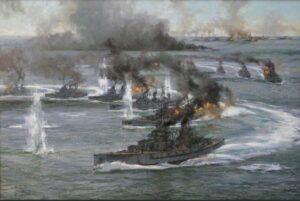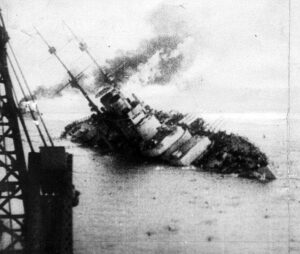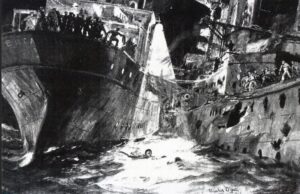 In the Battle of Trafalgar, on October 21, 1805, the British Royal Navy took on the combined fleets of the French and Spanish Navies during the War of the Third Coalition (August–December 1805) of the Napoleonic Wars (1803–1815), and soundly defeated them. As the French and Spanish Navies came into sight, Admiral Horatio Nelson raised one set of signal flags. His orders were simple and direct, “England expects every man to do his duty.” His men knew exactly what he meant and what was expected of them…fight, and if necessary, die for their country!! Without hesitation, Nelson’s ships closed in on and destroyed their enemy. The victory of this battle has been called the greatest naval victory in history, and for the remainder of the century, the British really had control over the oceans and the world. In the years following that victory, the British grew lackadaisical about keeping a strong military force, and 111 years later, that issue would be evident for the British Royal Navy when they went up against the Germans in the Battle of Jutland.
In the Battle of Trafalgar, on October 21, 1805, the British Royal Navy took on the combined fleets of the French and Spanish Navies during the War of the Third Coalition (August–December 1805) of the Napoleonic Wars (1803–1815), and soundly defeated them. As the French and Spanish Navies came into sight, Admiral Horatio Nelson raised one set of signal flags. His orders were simple and direct, “England expects every man to do his duty.” His men knew exactly what he meant and what was expected of them…fight, and if necessary, die for their country!! Without hesitation, Nelson’s ships closed in on and destroyed their enemy. The victory of this battle has been called the greatest naval victory in history, and for the remainder of the century, the British really had control over the oceans and the world. In the years following that victory, the British grew lackadaisical about keeping a strong military force, and 111 years later, that issue would be evident for the British Royal Navy when they went up against the Germans in the Battle of Jutland.
Apparently not understanding that things were no longer what they used to be, a British naval force commanded by Vice Admiral David Beatty confronted a squadron of German ships, led by Admiral Franz von Hipper, approximately 75 miles off the Danish coast, just before 4:00 on the afternoon of May 31, 1916. In what was later called the greatest naval battle of World War I, the two squadrons opened fire on each other simultaneously, beginning the opening phase of the Battle of Jutland.
Following the Battle of Dogger Bank in January 1915, the German navy knew that they were, at the very least, numerically inferior to the British Royal Navy, so the Germans chose not to engage them in a major battle for more than a year. During that time, they began pursuing a new strategy for their naval warfare…namely, its lethal U-boat submarines. Biding his time, Vice Admiral Reinhard Scheer waited until May 1916, when the majority of the British Grand Fleet was anchored far away, at Scapa Flow, off the northern coast of Scotland. Then Sheer, the commander of the German High Seas Fleet, believed the time was right to resume attacks on the British coastline. The unique coding system of the U-boats made it very difficult for the British to know what was coming. Scheer ordered 19 U-boat submarines to position themselves for a raid on the North Sea coastal city of Sunderland while using air reconnaissance crafts to keep an eye on the British fleet’s movement  from Scapa Flow. The first planned raid was scrapped because of bad weather, and Scheer instead ordering his fleet, consisting of 24 battleships, five battle cruisers, 11 light cruisers, and 63 destroyers, to head north, to the Skagerrak, a waterway located between Norway and northern Denmark, off the Jutland Peninsula, where they could attack Allied shipping interests…hoping to punch a hole in the stringent British blockade.
from Scapa Flow. The first planned raid was scrapped because of bad weather, and Scheer instead ordering his fleet, consisting of 24 battleships, five battle cruisers, 11 light cruisers, and 63 destroyers, to head north, to the Skagerrak, a waterway located between Norway and northern Denmark, off the Jutland Peninsula, where they could attack Allied shipping interests…hoping to punch a hole in the stringent British blockade.
Truly, the only thing that saved the British Grand Fleet that night was that unbeknownst to Scheer, a newly created intelligence unit located within an old building of the British Admiralty, known as Room 40, had cracked the German codes and warned the British Grand Fleet’s commander, Admiral John Rushworth Jellicoe, of Scheer’s intentions. So, the night before the planned attack…May 30, 1916, a British fleet of 28 battleships, nine battle cruisers, 34 light cruisers, and 80 destroyers set out from Scapa Flow, bound for positions off the Skagerrak.
Then, on May 31, 1916, at 2:20pm, Beatty, leading a British squadron, spotted Hipper’s warships. The squadrons quickly maneuvered south to get a better position, and shots were fired at about 3:48 that afternoon. They fought for 55 minutes, the British losing two British battle cruisers, Indefatigable and Queen Mary. Over 2,000 sailors lost their lives in the battle. At 4:43pm, Hipper’s squadron was joined by the remainder of the German fleet, commanded by Scheer. The British were out gunned, and Beatty was forced to fight a delaying action for the next hour, until Jellicoe could arrive with the rest of the Grand Fleet.
Once both entire fleets were there, they faced off. It was a huge battle of naval strategy between the four commanders, and particularly between Jellicoe and Scheer. As the fleets continued to engage each other throughout the late evening and the early morning of June 1, Jellicoe maneuvered 96 of the British ships into a V-shape surrounding 59 German ships. Hipper’s flagship, Lutzow, was disabled by 24 direct hits, but was still able to sink the British battle cruiser Invincible, before it sank too. Just after 6:30 on the evening of June 1, Scheer’s fleet executed a previously planned withdrawal under cover of darkness to their base at the German port of Wilhelmshaven, ending the battle and cheating the British of the major win they had envisioned.
The Battle of Jutland…or the Battle of the Skagerrak, as it was known to the Germans, involved a total of 100,000 men aboard 250 ships over the course of 72 hours. The Germans, claimed vistory, and the British had to agree…at first anyway. The German navy lost 11 ships, including a battleship and a battle cruiser, and 3,058 men lost their lives. The British losses were heavier, with 14 ships sunk, including three battle cruisers, and 6,784 lives lost. The only thing that made the British losses seem less was that ten more German ships had suffered heavy damage, and by June 2, 1916, only 10 of the German ships that had been involved in the battle were ready to leave port again. Jellicoe, on the other hand, could have put 23 British ships to sea. On July 4, 1916, Scheer reported to the German high command that further fleet action was not an option, and that  submarine warfare was Germany’s best hope for victory at sea. Despite the missed opportunities and heavy losses, the Battle of Jutland had left British naval superiority on the North Sea intact, but if they had been better prepared, they might have held a place of domination over the Germans then. When a nation decides to sit back and ride on its reputation, rather than continue a practice of a strong military force, that nation can find itself in a tough spot when the enemy attacks. The British could have had a very different outcome, but maybe better aim or the favor of God held the German High Seas Fleet at bay. They made no further attempts to break the Allied blockade or cross the Grand Fleet for the rest of World War I.
submarine warfare was Germany’s best hope for victory at sea. Despite the missed opportunities and heavy losses, the Battle of Jutland had left British naval superiority on the North Sea intact, but if they had been better prepared, they might have held a place of domination over the Germans then. When a nation decides to sit back and ride on its reputation, rather than continue a practice of a strong military force, that nation can find itself in a tough spot when the enemy attacks. The British could have had a very different outcome, but maybe better aim or the favor of God held the German High Seas Fleet at bay. They made no further attempts to break the Allied blockade or cross the Grand Fleet for the rest of World War I.


Leave a Reply